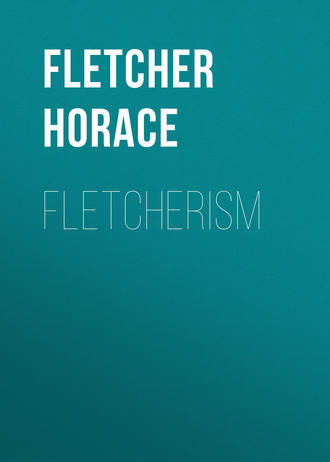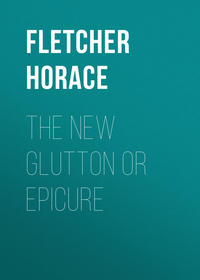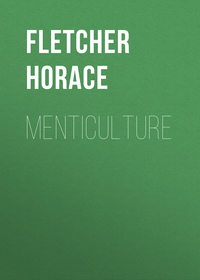 полная версия
полная версияFletcherism
You will find the literary quality of Dr. Cannon's book so fascinating, no matter whether you know the meaning of the terms used or not, that you will enjoy it like a novel. It has the charm of the diction of Sir Michael Foster and Sherlock Holmes combined, with enough of the solving of the secrets of the alimentary canal to satisfy the most exacting imagination.
If a taste for the inner mysteries has been acquired by the reading of Professor Cannon's book, further desires in that direction may be satisfied by reading the physiological prose poem by Professor Chittenden, in praise of head digestion as the acme of sensual pleasure. It is a gem, and is quoted in Chapter VII following, in support of the contention of this chapter. This poem appears in the book The Nutrition of Man (as studied mainly in starving dogs), and one wonders why such a pearl of practical, every-day, Kindergarten, domestic usefulness should be "thrown to the dogs," so to speak.
CHAPTER VII
CHITTENDEN ON CAREFUL CHEWINGA Physiological Prose PoemIt is difficult to imagine a more pleasurable Epicurean felicity than that described by Professor Russell H. Chittenden, of the Sheffield Scientific School, of Yale University, in America, as the result of careful masticating and thorough tasting of the commonest of foods.
Professor Henry Pickering Bowditch, of Harvard University Medical School, like Sir Michael Foster and all the most eminent physiologists, were quick to appreciate the revelations of the Cambridge investigation of Fletcherizing as indicating the discovery of the missing link in the chain of processes necessary for securing good digestion and healthy nutrition, but they looked on it as a question of profitable economy rather than material for poetic enthusiasm.
It was given to Professor Chittenden to discover the rarest merit of decent eating; the politeness of it, as well as the poetry; that element of respectability which will eventually recommend it to the socially-refined as one of the civilised fine arts; that expression of appreciation which is due to Mother Nature for her many beneficences.
THE POETRY OF EATINGBy Russell H. Chittenden"With the mind in a state of pleasurable anticipation, with freedom from care and worry, which are liable to act as deterrents to free secretion, and with the food in a form which appeals to the eye as well as to the olfactories, its thorough mastication calls forth and prolongs vigorous salivary secretion, with which the food becomes intimately intermingled. Salivary digestion is thus at once incited, and the starch very quickly commences to undergo the characteristic change in soluble products. As mouthful follows mouthful, deglutition alternates with mastication, and the mixture passes into the stomach, where salivary digestion can continue for a limited time only, until the secretion of gastric juice eventually establishes in the stomach-contents a distinct acid reaction, when salivary digestion ceases through destruction of the starch-converting enzyme. Need we comment, in view of the natural brevity of this process, upon the desirability for purely physiological reasons of prolonging within reasonable limits the interval of time the food and saliva are commingled in the mouth cavity? It seems obvious, in view of the relatively large bulk of starch-containing foods consumed daily, that habits of thorough mastication should be fostered, with the purpose of increasing greatly the digestion of starch in the very gateway of the alimentary tract. It is true that in the small intestines there comes later another opportunity for the digestion of starch; but it is unphysiological, as it is undesirable, for various reasons, not to take full advantage of the first opportunity which Nature gives for the preparation of this important foodstuff for further utilisation. Further, thorough mastication, by a fine comminution of the food particles, is a material aid in the digestion which is to take place in the stomach and intestines. Under normal conditions, therefore, and with proper observance of physiological good sense, a large portion of the ingested starchy foods can be made ready for speedy absorption and consequent utilisation through the agency of salivary digestion.
"Nowhere in the body do we find a more forcible illustration of economical method in physiological processes than in the mechanics of gastric secretion. Years ago it was thought that the flow of gastric juice was due mainly to mechanical stimulation of the gastric glands by contact of the food material with the lining membrane of the stomach. This, however, is not the case, as Pawlow has clearly shown, and it is now understood that the flow of gastric juice is started by impulses which have their origin in the mouth and nostrils; the sensations of eating, the smell, sight and taste of food serving as physical stimuli, which call forth a secretion from the stomach glands, just as the same stimuli may induce an outpouring of saliva. These sensations, as Pawlow has ascertained, affect secretory centres in the brain, and impulses are thus started which travel downward to the stomach through the vagus nerves, and as a result gastric juice begins to flow. This process, however, is supplemented by other forms of secretion, likewise reflex, which are incited by substances, ready formed in the food, and by substances – products of digestion – which are manufactured from the food in the stomach. Soups, meat juice, and the extractives of meat, likewise dextrin and kindred products, when present in the stomach, are especially active in provoking secretion. When the latter foods have been in the stomach for a time, however, and the proteid material has undergone partial digestion, then absorption of the products so formed calls forth energetic secretion of gastric juice. It is thus seen that there are three ways – all reflex – by which gastric juice is caused to flow into the stomach as a prelude to gastric digestion. Further, it has been shown by Pawlow that there is a relationship between the volume and character of the gastric juice secreted and the amount and composition of the food ingested, thus suggesting a certain adjustment in the direction of physiological economy well worthy of note. A diet of bread, for example, leads to the secretion of a smaller volume of gastric juice than a corresponding weight of meat produces, but the juice secreted under the influence of bread is richer in pepsin and acid, i. e., it has a greater digestive action than the juice produced by meat. The suggestion is that gastric juice assumes different degrees of concentration, with different proportions of acid and pepsin, to meet the varying requirements of a changing dietary."
CHAPTER VIII
THE THREE INCHES OF PERSONAL RESPONSIBILITYThe Effect of Prejudice – Professor Fisher's ExperimentWhile Professor Cannon was groping about in Nature's alimentary preserves in comparative darkness, I concentrated my attention upon the first three inches of the canal which comprise the field of our personal responsibility, and which has been neglected by most of the students of the subject.
While the area considered was right out in front, and open to visual inspection all the time, the opportunity to study its most important features having to do with nutrition was not continuous. Mr. Edison may rivet his attention on an electrical problem and stick to it for forty-eight hours on a stretch, but Taste is only occasionally on exhibition for observation and cannot be pressed into long service at any one time. For test of normal Taste only the time required for the most economic nutrition is available. A real body-need with keen appetite is the first healthy excuse for calling on Taste to perform. Normal appetite, too, being satisfied with appetising foods, is of brief duration. One may linger over a meal as long as desired, enjoying the intimate memory of the gustatory gratification in leisurely process, but in case of a first-class labouring man's hunger and the exigency of a railway station dinner in the midst of a desert, industrious application of faithful Fletcherizing for fifteen minutes will usually supply the real needs of the moment for eight hours at least. This estimate involves a healthy condition of the nutrition department, including an abundance of powerful saliva for the hastening of the mouth treatment, but such a beatific facility can be secured in a very short time by the faithful and intelligent employment of all departments of head digestion.
A person who specialises on the mouth end of the alimentary canal has plenty of time to rest between inspections. He will naturally watch for any feeling of results that may happen while Mother Nature is doing her twenty-five feet of digestion and absorption, but if his part has been performed properly, there will be no news of the process until there is something to excrete from the material ingested. When this occurs, if a microscope is handy for minute inspection, it will be found that most of the excreta is composed of what I think of as the dandruff of the alimentary canal. It is composed of shapeless particles of skin which have been discarded by the mucous surface of the canal in the same manner that dead skin is being continually detached from the head and all parts of the external surface of the body. Depending on the nature of the food, there may be small particles also of indigestible cellulose from vegetable foods and the condensed solids of the digestive juices when they have been used and worn out.
THE EFFECT OF PREJUDICEI have noticed that the early prejudices in favour of or against foods are likely to prevail throughout life. I have observed this in trying to secure local appreciation for my own favourite New England dishes in foreign countries. Tinning, or canning, science has made it possible to serve Boston baked beans and brown bread or even an entire Thanksgiving Dinner in Japan or Borneo, but it is impossible to excite native appreciation for them commensurate with the cost and trouble of the transportation. In Scandinavia, where they file the appetite to the keenest of edges with the piquancy of the "Smoer Broed," or "Smoer Goes,"11 the American taste for very sweet things is not appreciated. Chocolates for that market are more bitter than sweet, and so it goes throughout the world where head digestion is important in determining the prescription of foods.
At one time, during a year and a half of travel in unusual countries where the French, English or American menu is not easily available, I never missed an opportunity to study the effect of head prejudice on digestion. If the fortunate opportunity occurs to sample the sumptuous "ris tavel" of Java, there will be the best of chances to confirm my observation in this regard. This dish is varied in sumptuousness, or variety, but the humblest offering of it consists of a large and deep soup plate piled high in the middle with snowy rice with each individual grain unbroken. This, to begin with, is a triumph of oriental culinary art. Surrounding this rice mountain are dabs of every sort of a "relish" any one ever imagined. You select these from tiers of plates borne in each hand by as many as a dozen servants, following each other in procession, and presenting opportunities of choice amounting to twenty or more, perhaps even thirty or more in extraordinary cases. Hence it is the privilege of the guest to take much or little of any, or all, of the condiments according to the state of his appetite or greed. All the colours and nearly the whole food kingdom are represented, and the temptation is increased by the art of rearrangement. There is no way of judging what each sort of relish is: It may be fish, fowl, vegetable, tuber, side-meat, or a combination of nuts or fruits, as far as the intelligence of the uninitiated goes.
There were several members of the party of foreigners of different degrees of prejudice against anything strange in appearance. To one, all of the comestibles were "utterly impossible," and remained so to the end; while to others curiosity got the better of suspicion, and finally the appetites looked forward to dinner-time with especial cordiality, for the rice-mountain relish-cordon and the complicated combination were digested with ease.
The standard dish, however, of the Javan dinner is boiled potatoes and beefsteak swimming in a pint of good butter gravy, so that even the conscientious dietist with vegetarian preferences may revel in something that smacks of home and mother, with such an abundance of luscious fruits that nothing but gustatory delight happens as a usual thing. Still, it is the same in Java or Japan, in London, Paris, Berlin, Vienna, Rome or New York, the digestion of food is under the control of the head and therefore may be called head digestion.
PROFESSOR FISHER'S EXPERIMENTThe most important large experiment for the testing of head digestion under conditions of strict scientific control was that inaugurated and conducted by Professor Irving Fisher, of Yale University, in America.
Professor Fisher occupies the Chair of Political Economy at Yale, has made extensive researches into the factors that influence the economies or extravagances of living, and is President of the Committee of One Hundred of the American Association for the Advancement of Science on Health.
Professor Fisher's interest in my revelations and tests relative to the potency of head digestion came primarily from a personal test which worked wonders for him in establishing a foundation for good health. He was not satisfied with the later Chittenden experiments, because they substituted academic prescription for natural selection in formulating the rules of the inquiry. Like myself, in conducting the original researches, Professor Fisher realised that the practical value of my discoveries was that no one needed a biological chemist to order his meals for him or tell his appetite what his body needed in the way of food elements.
The Fisher experiment worked with nine healthy undergraduates who were ambitious to take high scholastic honours, and who had little time for athletics or any form of physical exercise, they being types of the average University undergraduate.
A generous table was supplied them with meat and every variety of food that usually composed college fare. The only instructions were that thorough mastication and especial attention to the enjoyment of the food as recommended by me in my books should be faithfully performed. This course was pursued for half a year, and for the rest of the year, in addition to the careful head treatment and enjoyment, preference was to be given to foods known to be low in nitrogen content; but not to the extent of suppressing any distinct call of appetite for them.
In the first half of the experiment the men held their own on about 40 per cent. less food, computed by cost, and increased their strength-endurance ability by something more than 100 per cent., with the added felicity of feeling unusually fit all of the time, entirely escaping the slack or sick spells they had been accustomed to, and improving greatly in their general studentability, that is: power of concentration, memory, mental comfort, profundity of sleep, etc.
During the second half of the experiment still more improvement was secured owing to the readiness of the body to accommodate itself to the wish by favouring the economies.
I have not a copy of the report at hand. It is included in the publications of Yale University about 1905.
While all of the abundance of confirmatory evidence which has accumulated since 1898 is valuable and gratifying, the verdict of the unremitting observation since then is that the problem of nutrition is always a personal one. After fifteen years of devotion to the study of the head-end question, with due attention to the tell-tale excreta and the product expressed in terms of energy and general comfort, I am unable to predict what my body is going to want to-morrow in the way of nutrition supply. I can say with some confidence that if I go on doing as I have been accustomed to doing daily, and no shock of grief or surprise intervenes to upset all calculations, I am likely to find nutritive satisfaction as expressed by appetite among the foods that are commonly agreeable to me.
If I am compelled or impelled to do a great stunt of walking or other unusual exertion, or receive crushing news, all my present predictions may be useless. The body itself, from the hair on the head to each finger or toe-nail will know what it wants and will have given to the caterer Appetite its requisition covering the need. In the meantime each brain cell and all of the bones have not been neglectful of their sustenance requirements, nor have they been backward in letting Appetite know.
It is fortunate that the common needs of digestion may be supplied from a limited range of food varieties. Milk is all-sufficient always for general supply of the nutritive requisites. In the plebeian potato, which has attained to royal rank as the result of the extensive experiments of Dr. Hindhede, of Denmark, in co-operation with Madsen the Faithful, has been found full nourishment for ten months, at least, when supplemented by butter or margarine to furnish the fuel supply. Even in this surprising revelation no academic prescription was infallible. Potatoes differ in nutritive value as much as 50 per cent. Fresh-cooked and well-cooked ones alone fill the bill of sufficiency, and full head-work in assuring easy digestion was made the first rule of the test. For four months I served as a check test-subject and speak from experience.
Nothing is ever accomplished except by a division of labour and on the just division of responsibility depends the success of effort. Nature has given to us the head-end of responsibility.
CHAPTER IX
QUESTION PRESCRIPTION AND PROSCRIPTIONThe Protein Enthusiast – Doubting Thomases
The only completely accurate prescriber of nutrition for living creatures is Mother Nature herself, and if she does not prescribe anything by the undoubted approval of appetite she proscribes it.
One of the rules which have governed my quest for optimum human nutrition in the midst of the twentieth century food supply and other conditions, has always been to go to Nature for final advice in the matter.
When I say "Question Prescription and Proscription" I mean that the most positive prescribers of food have something in the food line or advice to sell, and they proscribe as positively anything that competes with their commercial product.
My eyes were opened to this possible snare and delusion by a great doctor of medicine,12 who is also one of the most ardent economists I have ever met – not a miser in any sense, but a religiously philosophical economist. He is almost as righteously indignant against any who use the trust which is placed in them by clients or patients for the selling of high-priced foods as he is at the makers, advertisers, retailers and prescribers of alcohol as a beverage. In his just opinion it is as wicked, or almost as wicked, to advise unprofitable extravagance of any sort as it is to prescribe poison.
To this discriminating philosopher food is the basis of health-wealth, and sacred to its divine usefulness.
The great harm that was done to the world by the academic prescription of excessive protein rations13 was that it started a vicious circle of extravagances which led as surely to untimely death as murder. The perpetrators of this pernicious prescription were innocent of intention to do harm; in fact, they were full of the most generous of motives in issuing their poisonous advice, and one of the most prominent, at least, paid the penalty by dying miserably of his own fatal ignorance.
I may also say that it is "presumption," advisably, for almost all prescriptions of food which do not have their basis on the natural body calls are presumptuous. Nature knows! If given a chance to show her knowledge Nature prescribes rightly and delivers her message in the form of appetite and the other instincts. She will do this in the midst of the most complicated of artificial food mixtures, as I have reason to know from personal experience, confirmed by many others over and over again.
Therefore I may say more surely than ever, that whatever NATURE PROVIDES and PERMITS as NOURISHMENT I HAVE NO RIGHT TO PROSCRIBE.
THE ONLY PRESCRIPTIONthat Honesty approves is the Optimum Economic Nutrition; and my great preceptor, Dr. Hindhede, the ideally honest scientist and doctor, ventures to prescribe only the plainest of foods that are delicious to a true, keen appetite, and cost the least through being in season and so common and easy to grow as to be cheapest.
This good and superlatively honest doctor does not Proscribe anything that Nature permits as food and he does not even Proscribe the transportation of grapes from Madeira to the North Cape of Norway for the enjoyment of those who can afford to pay for them.
Would the Proscribers of flesh food have denied Amundsen and his companions the flesh of their faithful dogs as a last resort in securing nourishment for the completion of their journey to the South Pole? It was their truly last resort in gaining the victory over the Ice God; and would to God that brave Captain Scott and his band of faithful ones had had such a last but saving resort to help them accomplish the eleven miles between them and rescue! But then, the world would have missed a model of altruism that is worth a million lives, and one of which million everybody would like to be, if their lives are worth the living.
THE PROTEIN ENTHUSIASTWhile writing this chapter I have been forwarded material for indignation and a text for condemnation in the form of a book so full of food prescription that it is positively poisonous, as read with the intelligence of my own and current knowledge of the subject, that it ought to be pilloried as a "Horrible Example" of presumptuous prescription and proscription. It is an advertisement pure and simple, but so prejudicial to the natural facts in the case that it again raises the question of the advisability of a Supreme Court of the Physiology of Nutrition, to try such nutrition perverters for high treason to Mother Nature.
I will not name the book or the author, to further the advertisement. I once stopped a controversy with the doctor-father of the author by offering to wager him one hundred pounds that I could beat him out on a ten mile go-as-you-please tramp, which he had mentioned as one of his stunts to prove his contentions. Our ages were nearly equal, and the difference of training consisted of his prescribing for himself over 100 grams of proteid daily (less by 20 per cent. than the vicious Voit14 or Kœnig Standards, and less by 30 per cent. than the Standard that killed poor Professor Atwater), while I had subsisted for years on less than half his prescription. He warned me that I was courting death, but that he was providing for himself longevity by the mile. He got mad with me, and nearly fumed at the mouth, because I assumed to insist that only Mother Nature was a competent prescriber, intimating that he was not. I could not out-talk him, and so I sent him a challenge. He made the excuse that he was leaving for the Continent for a rest, but would talk further with me when he returned. His reputed forty-thousand-pound office practice of prescribing his favourite dietaries had worn him out and he was going for a rest. Later I heard of him in a sanatorium – surely disgraceful to a doctor to be compelled to go to such a place for "treatment."
The race, or contest, never took place, but since then I personally have several times broken records established by men one-half, and even one-third, of my age with progressive ease up to three years ago when last put to a test, and I have noted no letting-up of the progress of recuperation as judged by "feelings" or endurance when doing unusual stunts.
In this direction I now feel that I have done enough, and that it is not for age to tempt Providence by competing with the Prime of Muscularity in feats of strength and endurance. John L. Sullivan and Jeffries and many more went once too often into the ring, and Mother Nature, not Corbett or Jack Johnson, knocked them out for good and all. Fletcherizing does not include either imprudence or bluff. It merely trusts good Mother Nature for directions to accompany her nutriment-medicine. Whenever at any time I feel the impulse to turn somersaults from the lead platform of a man-of-war into good, clean salt-water – as I did a few years ago or so in the Philippines, as a demonstration to impress the natives – I will "up and do it, or die in the attempt." What I am doing now more than ever is keeping my ear to the mouth of Mother Nature, my finger on her pulse of command, and doing her biddings as well as I can interpret them. If a thing is not agreeable to do, I take it as a warning not to do it. There are so many useful things to do that are pleasant, what is the use of going out of the way to do disagreeable things. There are some things that are natural and agreeable that we should do, and which we have got out of the habit of doing, physical exercise, for instance. We are dealing with cultivated abnormalities always in a cramped and complex civilisation. "We are constantly doing the things that we should not do, and leaving undone those things that we ought to do," as the Prayer Book tells us, including carelessness of eating, and shirking physical exercise.





